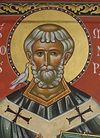

| Previous day | Next day |
| Old Style
March 12
|
Wednesday |
New Style
March 25
|
|
4th Week of Great Lent.
Tone 7.
Great Lent. |
Monastic rule: xerophagy (bread, uncooked fruits and vegetables).
|
![]() St. Theophanes the Confessor, of Sigriane (818).
St. Theophanes the Confessor, of Sigriane (818).
Righteous Phineas, grandson of Aaron (ca. 1500 b.c.). St. Gregory the Dialogist, pope of Rome (604). Sts. Symeon the New Theologian (1021), and his elder, Symeon the Reverent, of the Studion (987).
New Hieromartyr Vladimir (Volkov), archimandrite, of Islavskoe (Moscow) (1938).
Icon of the Most Holy Theotokos “Not-Made-by-Hands” (on the Pillar) at Lydda (1st c.).
Righteous Aaron the High Priest, brother of Prophet Moses the God-seer (ca. 1530 b.c.). St. Cyrus, monk, of Alexandria (6th c.). St. Paul Aurelian, bishop of Leon in Brittany (572). St. Alphege, bishop of Winchester, England (951). St. Nicodemus of Mammola in Calabria (990). Martyr Demetrius the Devoted, king of Georgia (1289). St. Dragutin (monk Theoctistus) of Serbia (1316).
Repose of Schemamonk Anthony the Gorge-dweller, of Zelenchug Monastery in Kuban (1908).
Thoughts for Each Day of the Year
According to the Daily Church Readings from the Word of God
By St. Theophan the Recluse

Wednesday.
Baptism (kreshenie) in the Russian language sounds like cross (krest). This is fortunate consonance, for although the visible action of baptism is submersion, its essence is a co-crucifixion with Christ on the inner, spiritual cross. The Apostle Paul says: our old man is crucified with him in baptism (Rom. 6:6). This is not some sort of mechanical act, but a moral change, or a revolution of thoughts, goals, desires, and sympathies. Before, all of these were stained with self-pleasure; now all are selflessly dedicated to God, in Christ Jesus, by the grace of the Holy Spirit. [If you were baptized as an infant] you will say, “I didn’t understand that when I was baptized.” Now you understand; set it in your conscience to carry out the meaning of baptism, for your baptism is indelible. Even at the judgement its seal will be visible either for you, or against you.









